OneWeb satellite company launches into new era
- Published
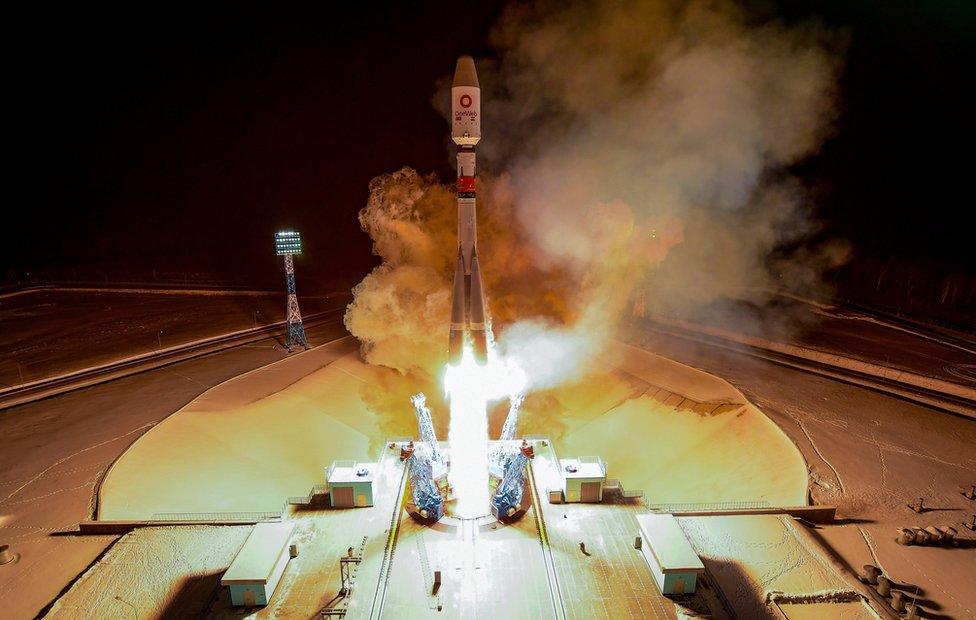
OneWeb lift-off: Vostochny is a relatively new spaceport in Russia's far east
The OneWeb satellite broadband company is back launching again, putting up 36 new satellites on Friday from the Vostochny Cosmodrome in Eastern Russia.
The spacecraft are to join the 74 already in orbit.
OneWeb is now owned principally by the Indian conglomerate Bharti Global and the UK government after they bought the enterprise out of bankruptcy this year.
Fifteen more launches of satellites must follow Friday's deployment to complete the internet delivery service.
These flights should be occurring on a near-monthly basis from February.
"We will be on track for our 50-degree North service by October next year - so, in 10 months' time. Then, slowly getting to 22 degrees and then global by May or June 2022," OneWeb chairman Sunil Bharti Mittal told BBC News.
This means, for example, that UK citizens could be using beta broadband connections in the autumn of 2021.
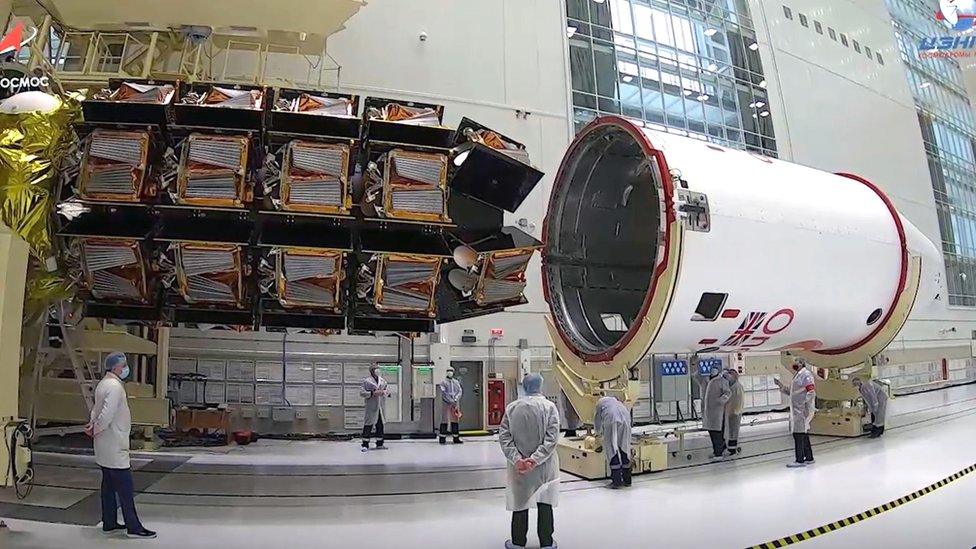
The 36 satellites are the first to be launched since the emergence from bankruptcy
The Soyuz rocket carrying the 36 new platforms left the Vostochny pad at 21:26 local time (12:36 GMT).
A near four-hour flight saw the spacecraft being dropped off in nine batches of four at an altitude of 450km.
All the satellites still need to be manoeuvred into position at the intended operating height of 1,200km above the Earth.
OneWeb control rooms in London and in Virginia, US, will oversee this task in the coming months.
Some 650 satellites in total are required for the first generation of the project.
Depending on how the business works out, these spacecraft will be replaced at some point with newer, better technology. OneWeb also has permission to grow the size of its constellation to increase capacity in the network.
But the imperative right now is to close the gap in financing for the first generation of the network.
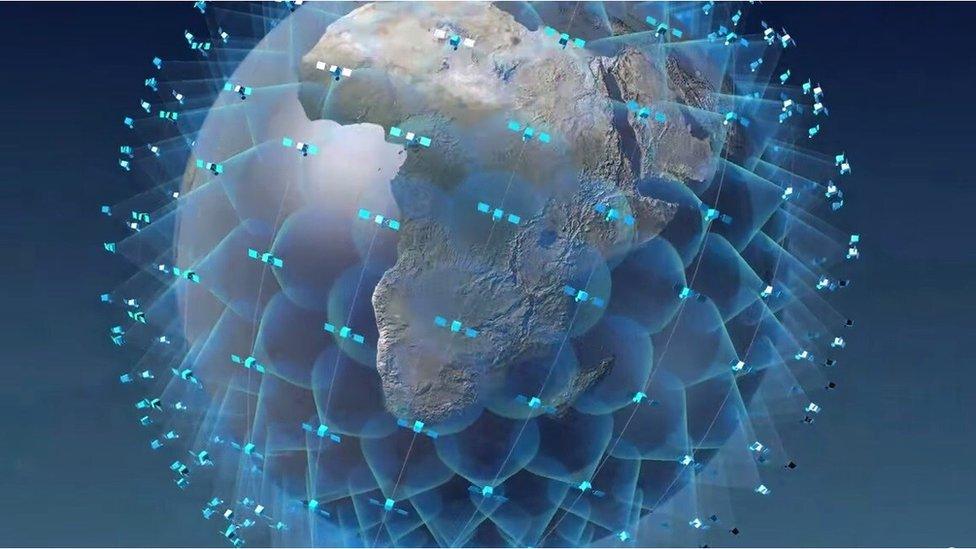
Artwork: The aim is to have the full satellite network in place in 2022
The Chapter 11 bankruptcy process in America wiped out OneWeb's existing debts, and although Bharti Global and the UK government pumped in a combined one billion dollars, there is still roughly $1.4bn-$1.5bn of funding outstanding.
Other urgent work concerns the ground stations across the globe that will talk to the satellites and connect them to the internet. These need to be set up at pace.
Also, there is the critical issue of terminals - the devices that customers on the ground use to access the broadband service. OneWeb is working with Intellian Technologies and Collins Aerospace.
The intention is not to sell direct to individual consumers but to link them up through telecom partners. And, indeed, the telecom companies themselves are likely to be using the system in the backbones of their mobile phone networks to transfer data.
"Then there is rural broadband - many schools, hospitals, critical installations in rural areas desperately need this connectivity. They will be spoken to," said Mr Mittal.
"There are large enterprise customers like the cloud providers, such as Amazon or Google. Then you have the UK Ministry of Defence and US Department of Defense, of course. Maritime and aviation, which are really very important, I think is still some time away."
OneWeb is promising a latency (the time taken for a data request to be received) on its broadband network of less than 50 milliseconds, with the highest throughput per beam to a terminal of 400 megabits per second downlink and 100Mbps uplink.
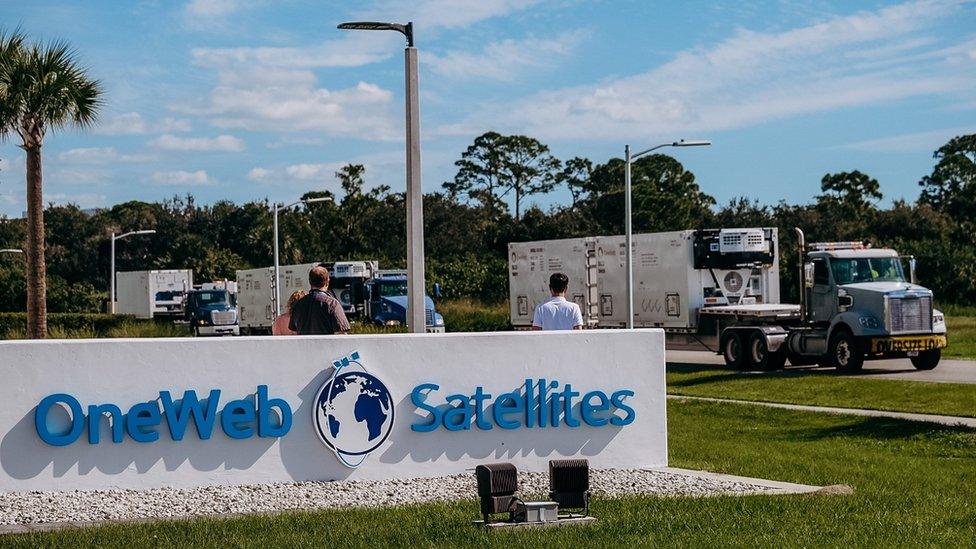
Manufacturing of the satellites is undertaken in Florida
OneWeb's chief competitor in the megaconstellation game is Starlink, which is being set up by the Californian rocket company SpaceX.
Starlink, which has nearly a thousand satellites in orbit now (the architecture of its network requires more satellites than OneWeb), has already begun beta testing with customers in northern latitudes. It is selling direct to the consumer.
Online retailer Amazon is known also to be planning a broadband satellite network and has ample funds through the personal wealth of its CEO and founder, Jeff Bezos, to make it happen. However, very few details about this Kuiper constellation, as it will be called, have so far been released.
There is a lot of interest in the UK now to see how the OneWeb project develops.
The manufacturing of the satellites for the first generation is all being done in the US state of Florida by a joint venture set up by OneWeb and the pan-European aerospace giant Airbus.
UK industry would like to see some of this work brought onshore - if not for the first generation then, certainly, for the second and later generations of the constellation.
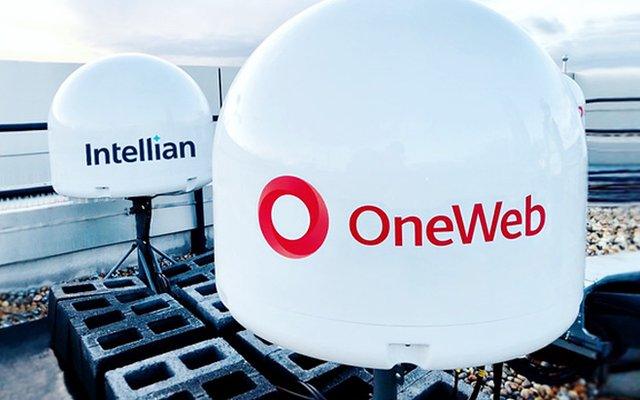
To connect with the OneWeb service, partners need special terminals
"Investing in OneWeb has been a bold statement by the British government and we're looking forward to seeing how this will benefit the UK industrial sector," said Nick Shave who speaks for the umbrella body UKSpace.
"We have seen some different statements from stakeholders, with some saying that work leading into gen-two will be onshored but then those with US interests saying the opposite."
These concerns about tangible industrial returns on the UK taxpayer's investment were echoed by Volodymyr Levykin, the CEO at Skyrora, the Edinburgh-based rocket company that will shortly start launching from Scotland.
"OneWeb's long-awaited return to launching satellites, as it resumes deployment of its low-Earth orbit constellation, provided a reminder of how much farther the UK government's investment needs to go in order to live up to its 'Made In Britain' billing," he told BBC News.
"That OneWeb's satellites are being launched using Russian-made Soyuz rockets and Fregat upper-stage units, from Russian soil - with subsequent launches planned for Russian, Kazakhstan, and French Guiana - and in partnership with French-headquartered Arianespace underlines just how much work remains to be done to achieve the government's stated aim of making the UK a global leader in the space industry."
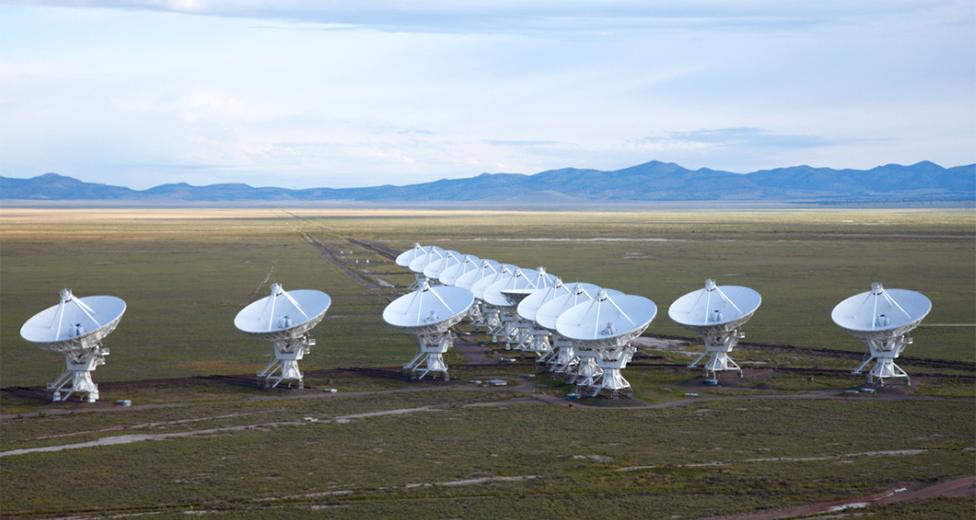
Astronomers working at all wavelengths have concerns about satellite interference
Mr Mittal has said generation two could look very different, incorporating some sort of PNT (Position, Navigation and Timing) capability and other security-type applications.
The Indian businessman has promised also to keep uppermost in his mind the environmental aspects of the project. By this he means not leaving any space junk in orbit and working to remove any interference the satellites might cause to astronomy.
"We have a commitment to best practice," said Chris McLaughlin, chief of government, regulation and engagement matters at OneWeb.
"On those who look to the stars - now that we're back we want to re-engage with that community and talk to them. Our chief technology officer has already been looking at the ways in which we can improve the satellites to reduce their reflectivity, etc."